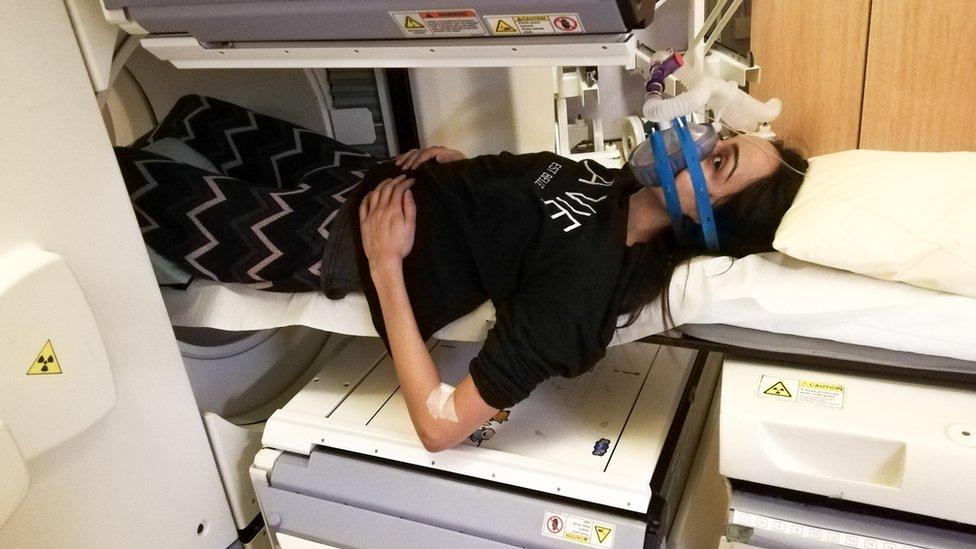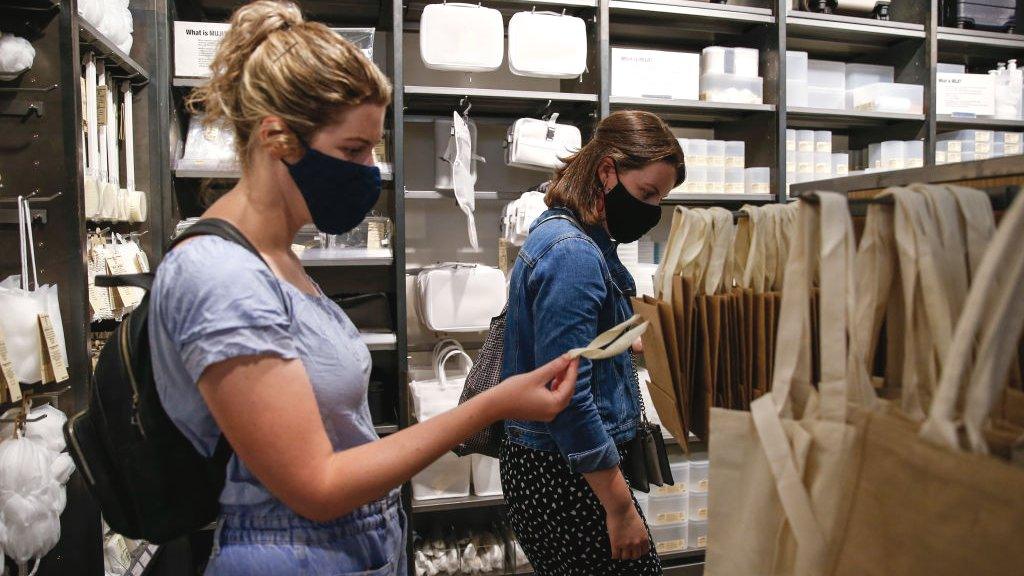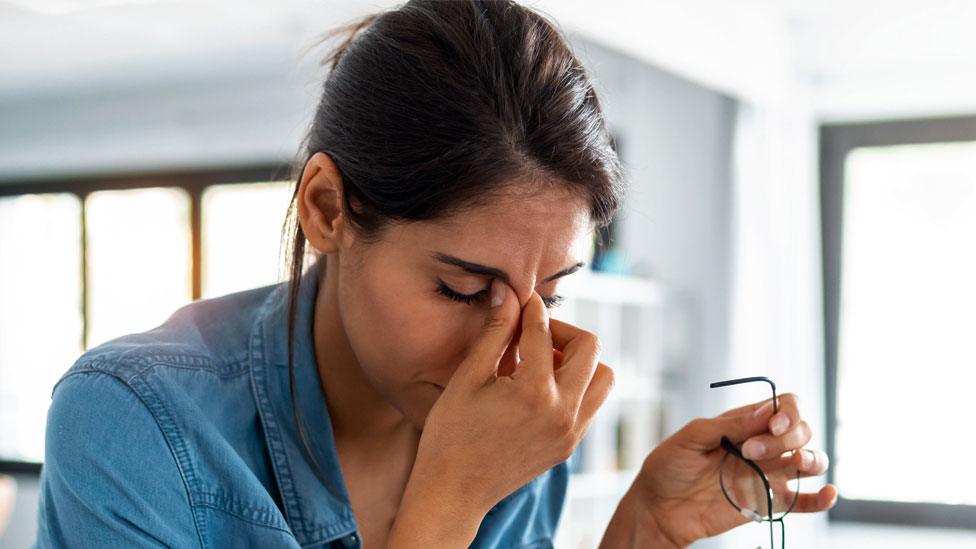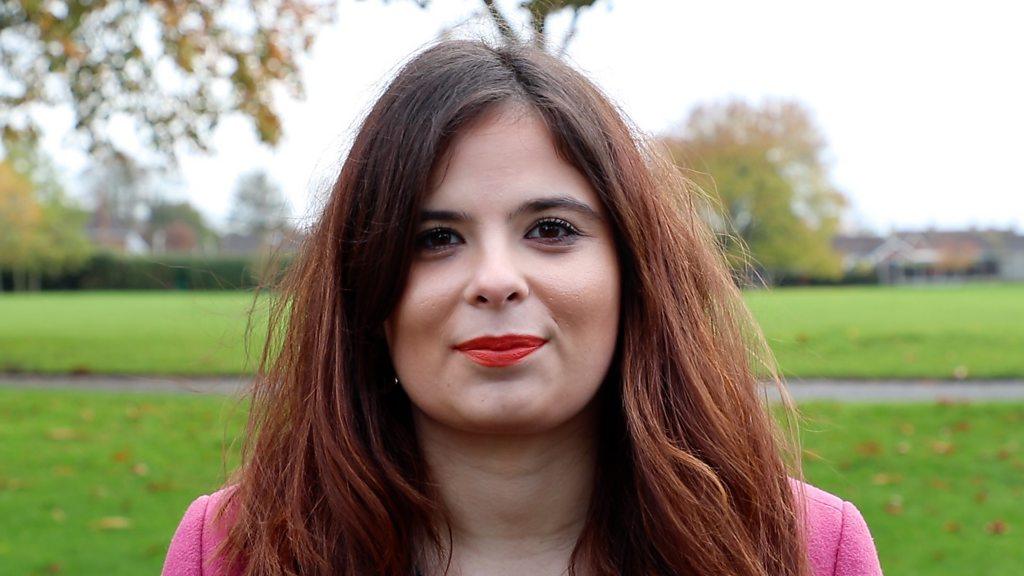Long Covid: Fears others will suffer when lockdown lifts
- Published

Jasmine Hayer has started a blog to help raise awareness of the symptoms of long Covid
A former health coach who said her life had been "destroyed" by long Covid is worried more people will suffer from it when restrictions are lifted.
Jasmine Hayer, 31, had to give up her life in London and move back in with her parents in Biggleswade, Bedfordshire, after catching the virus in March 2020.
She has never fully recovered and said she still struggles to walk and talk.
The government said it had opened more than 80 long Covid assessment services.
Ms Hayer has experienced chest pains, shortness of breath, weight loss, "stabbing pains" in her heart, irregular periods, acid reflux, an increased heart rate, palpitations, depression and insomnia since catching the virus.
She said she was housebound about "80 to 90% of the time".
Under planned changes due to come into effect in England from 19 July, face masks will no longer be legally required, and social distancing rules will be abandoned.
But Ms Hayer said: "I implore you to continue to wear a mask and social distance where possible because take it from me, you don't ever want to risk the insidious horror of long Covid."

She was training to be a yoga teacher and was working as a health coach before she got the virus
Announcing the changes on Monday at a Downing Street press conference, Boris Johnson said the government was looking to "move away from legal restrictions" and would instead allow people "to make their own informed decisions about how to manage the virus".
But he warned "we must reconcile ourselves, sadly, to more deaths from Covid", and said he would continue to wear a mask himself in crowded places as "a courtesy".
Some doctors warned it was the wrong time to lift restrictions, with case rates still high.
The British Medical Association asked the government to keep some measures in place, including face masks and ventilation.
It cited evidence that one in 10 people with Covid suffered from the long-term impacts of the virus, and warned of potential "serious consequences" for the NHS and wider society, external from unlocking.

What is long Covid?
Long Covid is an emerging phenomenon not yet fully understood and there is no universally-agreed definition.
It covers a broad range of symptoms including fatigue, coughs, headaches and muscle pain.
Most people who get coronavirus feel better in a few days or weeks, but symptoms can last longer for some, even if they had a mild infection.
It is thought more than two million people in England may have had some long-lasting symptoms.
Women and those aged 35-49 are most likely to report long-term symptoms.
Source: NHS/ONS

Prof Chris Whitty, England's chief medical officer, was asked at the press conference how effective vaccines were at preventing long Covid.
He said the data was not clear, but that because vaccines prevented people from catching Covid, that was of course a protection against long Covid.

Ms Hayer hopes her blog can help other people get the right diagnosis and treatment
Ms Hayer said the government's narrative "does not include the experiences that have happened to me and more than two million others".
She added: "Covid positive cases are rising, especially in young people, as well as the amount of long-haulers.
"Stupendously, it is now that the government are relaxing the very conditions designed to protect us.
"Despite the success of the vaccine, it doesn't mean we can now afford to take such a gamble with people's lives."
She said she wanted life to return to normal but knew first-hand "the wrath of this virus" and believed we "cannot take any chances for any more of the population to become debilitated as a result".
Blood clots
Doctors dismissed her symptoms as anxiety until she started being treated by respiratory specialist Dr William Man who runs a Royal Brompton Hospital clinic investigating 100 severe cases.
A lung gas transfer test showed her breathing levels to be 53%, the same level as a patient with lung disease.
Doctors found blood clots on her lungs which were treated with blood thinners.
An echocardiogram showed a build-up of fluid around her heart and she was diagnosed with post-Covid heart inflammation.

She never thought anything like this could happen to her as she was so fit and healthy and was not in hospital with the virus initially
More than 500 people with long Covid have contacted Ms Hayer since a BBC article about her case, with many showing the article to their doctors "in the hope of being taken seriously", she said.
She has collated more than 200 of the stories for a project called Hidden Voices, external which aims to "give long-haulers a voice".

She is hoping to return to London and finish her qualifications to become a yoga teacher
A spokesperson for the Department of Health and Social Care said: "The government rapidly provided specialist care for acutely ill Covid-19 patients at the start of the pandemic and we've matched that speed and scale in our support for people with long Covid.
"To help people suffering the debilitating long-term effects of this virus, we have opened more than 80 long Covid assessment services and in June NHS England published a £100m plan, including £30m to help GPs improve diagnosis and care for patients with long Covid.
"At the same time we are backing our exceptional scientists with over £50m for research to better understand the long-term effects to ensure the right help and treatments are available."

Find BBC News: East of England on Facebook, external, Instagram, external and Twitter, external. If you have a story suggestion email eastofenglandnews@bbc.co.uk
Related topics
- Published5 July 2021

- Published16 March 2022

- Published3 July 2021

- Published7 April 2021

- Published30 June 2021

- Published24 June 2021

- Published26 November 2020

- Published6 October 2020
